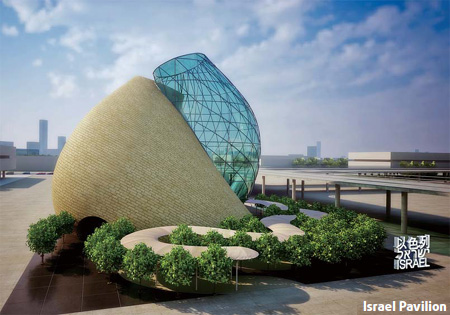The Israel Pavilion will take the shape of a seashell with two parts hugging each other to illustrate the country's development "from creation to creativity" at the upcoming Shanghai Expo.

To highlight the sub-theme "Innovation for Better Life", the pavilion will show how Israel compensates for its paucity of natural resources by making clever use of sophisticated technology.
"Israel is a country that does not have enough land and water," said Yaffa Ben-Ari, the country's deputy commissioner-general to the Shanghai Expo. "But we do have a long history of development.
"We know how to utilize our intelligence and promote technological innovation to make a better life."
The innovative and futuristic structure spans 2,000 sq m, of which its main building occupies 1,200 sq m, and reaches 24 m in height.
The pavilion consists of three main areas: the Enlighten Garden, the Hall of Light and the Hall of Innovation. The three parts "join hands" with each other to represent the relationship between the country's past, present and future.

Ben-Ari said the appearance of the pavilion is similar to the yin and yang symbols of tai chi that feature so prominently in Chinese culture.
The Enlighten Garden is a meticulously designed orchard capable of accommodating up to 300 visitors at a time. Built with advanced irrigation systems designed by Israelis, it will be surrounded by the country's indigenous plants.
Fifty-four orange trees will be planted in the orchard. The number has symbolic value as it is three times 18, a number that in Hebrew represents life, said Ben-Ari.
In the garden, visitors will get the chance to learn more about Israel's innovations in agriculture and environmental protection through various exhibits.
The Hall of Light will be covered by PVC glass to symbolize transparency, light and the future of Israel. A 15-m high screen will be placed in the front of the hall to show films highlighting the country's innovations and technological achievements.
Meanwhile, the Hall of Innovation will be built with natural stone. It will represent Israel's history and the Jewish people's close connection with the earth.
Designers will also be paying special attention to the bountiful examples of Jewish culture in Shanghai, with a particular focus on the city's role as a place of refuge for Jews during World War II.

